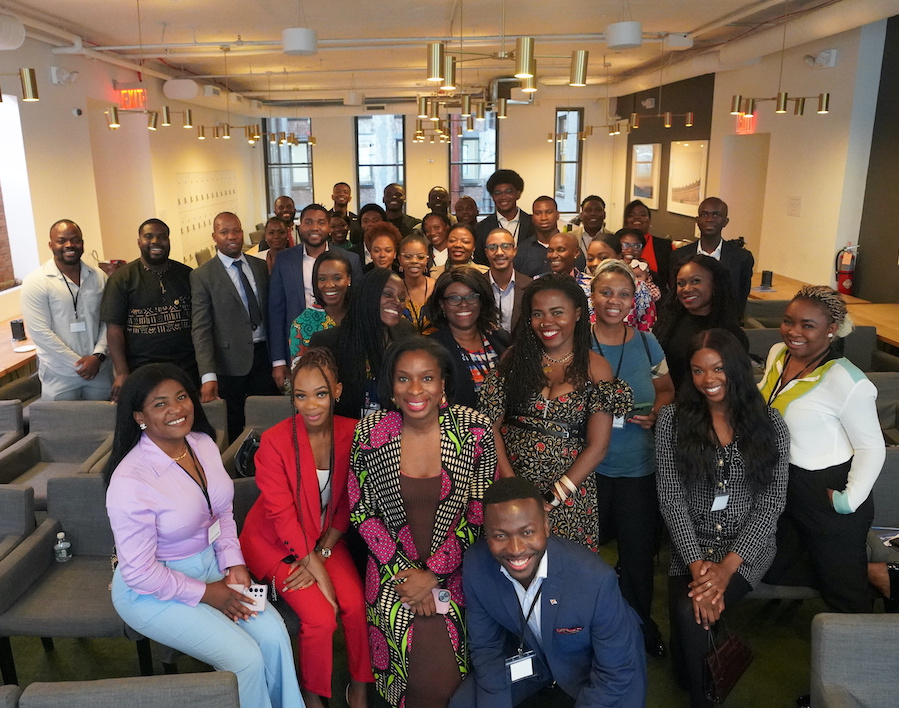
CDIS 2023
Congo: Powering the Global Supply Chain
On September 22 and 23, 2023, CDIS hosted its third summit, “Congo: Powering the Global Supply Chain” in New York City.
The summit featured two fireside chats with Dr. James Mwangi, CEO of Equity Group Holdings Plc, and Reshma Shah, Sustainability Group Director of Equity Group Holdings Plc, a Kenyan-based financial services conglomerate with a significant presence in Africa, including the DRC through its subsidiary, Equity BCDC. Equity BCDC is the second-largest bank in the DRC.
-
- In our first fireside chat with CDIS co-founder Lukogho Kasomo, Dr. Mwangi highlighted DRC’s great potential as one of Equity’s growing markets. He highlighted that the DRC’s admission into the East African Community (EAC) in 2022 would greatly benefit the DRC–especially because the DRC would have access to the EAC’s legal and trade infrastructure to operate in a larger economic market.
- Equity Bank has also worked hard to best position its customers in DRC with economic opportunities in the EAC by digitizing services between DRC and the Port of Mombasa, one of East Africa’s major trade hubs.
- Dr. Mwangi also highlighted the great potential economic opportunities in the DRC when it comes to clean and renewable energy. He identified hydroelectric power, in addition to wind, geothermal, solar energy, as areas where the Congolese government and the diaspora should invest. And finally, he encouraged that the Congolese Diaspora return to the DRC and become “brain gain” that the country needs to reach its true socioeconomic potential.
- Our second fireside chat, a conversation between U.S.-Africa Policy Strategist Marielle Thete and Equity’s Sustainability Group Director Reshma Shah, focused on Equity Bank’s sustainability projects across Africa, including the DRC. Ms. Shah raised how Equity Bank is supporting projects focused on solar energy ranging from the household level to small and medium-sized enterprises, as examples of their sustainability initiatives.
- Furthermore, Ms. Shah highlighted the agriculture as another sector that the diaspora could invest in, particularly because the diaspora knows local farming practices that could contribute to actual sustainability–it is not solely the West that possesses knowledge on such matters.
- The fireside chat closed with discussion about the Congolese mining sector, and Ms. Shah mentioned the many opportunities for investment in the mining ecosystem that requires investment, including support services like technology, logistics, hospitality, and energy. These are all areas diaspora investors should consider exploring.
The Summit’s main panel, “Congo: Powering the Global Supply Chain,” focused on how the DRC, with all of its natural resources, is an invaluable part of the global supply chain. This session, also moderated by Marielle Thete, included Jonathan Katende, CEO of Lipaworld, Stella Safari, CEO of Zapenda, and Dr. Yvan Yenda Ilunga, Assistant Professor of Political Science and International Relations at Salve Regina University.
Dr. Ilunga provided an overview of the geopolitical dynamics shaping the U.S., China, and Europe’s conduct regarding Congo’s abundant cobalt and copper supplies. Mr. Katende highlighted the work of his Pan-African fintech startup that has innovated the remittance space by offering digital vouchers as a form of cross-border payment, in addition to how the Diaspora can leverage this platform for their financial transactions in the Congo.
An additional perspective was provided by Stella Safari, the founder and CEO of Zapenda, an African-inspired fashion brand with roots in Congo, who employs Congolese tailors in Bukavu to make her products as part of her supply chain.
Ms. Safari and Mr. Katende also discussed the business climate in DRC–while noting the many opportunities–that there is still a need for more well-defined laws to regulate business activities in the country.
The group concluded the session with a discussion about the strategic importance of the Congolese people, most notably the youth, as a critical part of the global supply chain and that diaspora investment in education and training can help harness that potential.